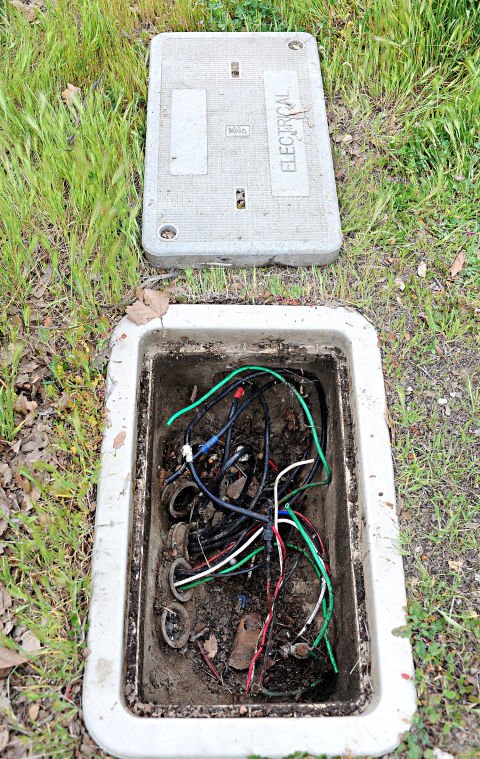
In response to a string of theft of copper wire from city-owned facilities over the past two years, Gilroy officials are considering adding teeth to regulations surrounding metal recycling within city limits. State law requires scrap metal recyclers document each transaction and record the seller’s name as a way to prevent theft, but compliance across California varies.
“The problem is, if we set up all these strict requirements in our city, the people who steal the material will go somewhere else—out of our jurisdiction—and pawn it,” Gilroy Police Department Chief Denise Turner said. “This is happening nationwide.”
In November 2013, a team of thieves snipped the connecting wires to the pathway lights in Christmas Hill Park—and to the softball field lights—and walked away with approximately 2,000 feet of copper wiring. Copper thieves typically trade in the stolen wiring to metal recyclers as a way to make quick cash, raking in as much as $3 per pound for the metal based on its purity. Potentially, the Christmas Hill Park thieves could have made $6,000 from the theft.
Thieves often strip copper wiring from vacant or unused properties and have taken it from streetlights around town in the past as well as the Gilroy Sports Park, Gilroy Planning Manager Susan Martin said.
Martin asked the council for direction at the Sept. 22 meeting on how they want to combat this type of infrastructure theft and suggested increasing restrictions on other items commonly stolen from municipalities and pawned for quick cash like manhole covers and fire hydrants. In the coming months, the City Attorney’s Office, the Gilroy Police Department and city staff will meet to find a solution to what has become an expensive problem for many communities.
“It seems like a good start but it doesn’t seem like it goes far enough to really do anything,” Council Member Dion Bracco said. “You get some of these folks who have a whole pickup full of copper pipe. Unless they’re plumbers, they stole it. It’s that simple and it’s the same thing with copper wire.”
Bracco said his friend operates a recycling center in Maui and he has a strict policy on not accepting scrap metal from the general public—no wire, no copper piping and only licensed contractors can turn items in.
“I would like to see some options on how we can make it tough so it actually does something—and not just another hoop for the business owner to jump through,” Bracco said.
While it only took the Christmas Hill Park copper thieves an hour or two to snip the wire, reel it in and drive away, it cost the city more than $150,000 to replace the lost wire and retrofit the pull boxes with anti-theft measures. Gilroy Parks Supervisor called the incident “the most blatant theft of infrastructure” he’d seen in nearly 40 years with the city.
The theft was so serious the council added $60,000 to next year’s budget to pay for private security to patrol Gilroy’s parks. But with approximately 12 metal recycling centers across Gilroy, Turner said she wants to see more cooperation between vendors and police.
“We need cooperation from all of the second-hand dealers and recyclers in town to act almost like pawn shops,” Turner added. “Any time someone brings something in to pawn, they’re required to show identification, the transaction is logged and the item has to be described. In the case of pawn shops, it’s a great investigative tool to catch burglars or robbers.”
Currently, the state mandates that scrap metal vendors maintain a log of all transactions, but compliance differs from city to city and from vendor to vendor. Since thieves can strip wire in one city and sell it elsewhere, Turner said in order for legislation to be an effective tool to catch thieves of copper wire, it needs teeth to allow for both increased local enforcement and regional collaboration.
“I’m hoping we can come to some sort of statewide resolution that would discourage these folks from stealing it and trying to pawn it,” Turner added. “Right now, we don’t do any inspection or enforcement. We want to move into something that’s a bit more robust.”
Copper theft is pervasive nationwide, federal authorities and local officials say it’s becoming a growing concern in Santa Clara County. In January, thieves took roughly 2,700-feet of copper wire from 15 streetlights and underground boxes in a southwest Morgan Hill neighborhood, while San Jose experienced theft of copper wire underground on a major highway in February.
Local officials will be discussing how to tackle the problem in the coming months and will gather information from other nearby cities, Turner said.














